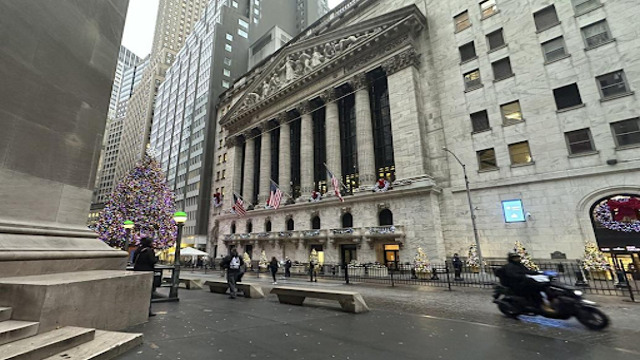
A scooter rides past the New York Stock Exchange in New York City's Financial District on Tuesday, December 17, 2024. (AP Photo/Peter Morgan)
U.S. stock markets saw a dip on Tuesday, retreating from the strong gains they had made earlier this year. The S&P 500 fell 0.4%, though it remains close to its record high set earlier in December. The Dow Jones Industrial Average dropped 0.6%, while the Nasdaq composite also slipped 0.3% from its recent peak. Despite these losses, the markets have had a solid year, and investors remain hopeful for the future, though some caution is beginning to emerge.
A key factor contributing to the market's pullback was Nvidia, the semiconductor giant that has been a significant driver of Wall Street's growth this year. The stock dropped 1.6% on Tuesday, marking its eighth decline in the past nine days. Over the past month, Nvidia’s stock has fallen by more than 10%, showing that the enthusiasm that fuelled its rapid rise is starting to wane. Critics have raised concerns that Nvidia's stock price may be overvalued, and maintaining its impressive momentum could prove difficult in the coming months.
Despite this setback, the broader market remains resilient. A recent survey by Bank of America showed that many fund managers are still optimistic, with many shifting their portfolios from cash to U.S. stocks. This suggests that investor confidence is high, although there are parallels to previous periods in 2002 and 2011, which preceded tougher times for riskier investments. The survey also found that optimism about economic growth is at its highest level since August 2021.
The S&P 500, despite its small decline, is still on track for one of its best years in two decades. This is largely due to the strength of the U.S. economy, which has continued to perform better than expected. Additionally, there are growing hopes that the policies of President-elect Donald Trump will help spur growth without igniting too much inflation. The Federal Reserve has played a role in keeping the economy buoyant by cutting interest rates, which are now at their lowest levels in two decades.
The Fed is widely expected to announce another interest rate cut on Wednesday, the third reduction of the year. However, the latest data shows strong retail sales growth, which could indicate that the economy does not need as much support from the central bank. While lower interest rates typically help stimulate economic growth, they can also contribute to inflation, which the Fed is trying to keep under control.
On the bond market front, Treasury yields remained fairly stable. The 10-year Treasury yield edged down slightly to 4.38%, while the two-year yield, which closely tracks the Fed’s rate decisions, dipped to 4.24%.
Tech stocks also had a mixed performance on Tuesday. Broadcom, another major player in the semiconductor industry, saw a 6% drop after two days of strong gains driven by a better-than-expected profit report. On the other hand, Pfizer helped limit market losses, rising 4.4% after issuing a stronger-than-expected profit forecast for 2024.
Globally, stock markets also showed signs of weakness. The FTSE 100 in London fell 0.8%, and Japan's Nikkei 225 slipped 0.2%, as investors await key interest rate announcements from the Bank of Japan later this week.
Meanwhile, Bitcoin continued its impressive rise, briefly reaching over $108,000 before pulling back to around $106,700. This represents a dramatic surge for the cryptocurrency, which was priced at around $44,000 at the beginning of the year.















